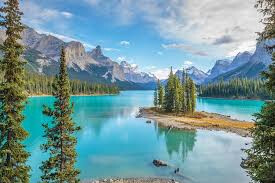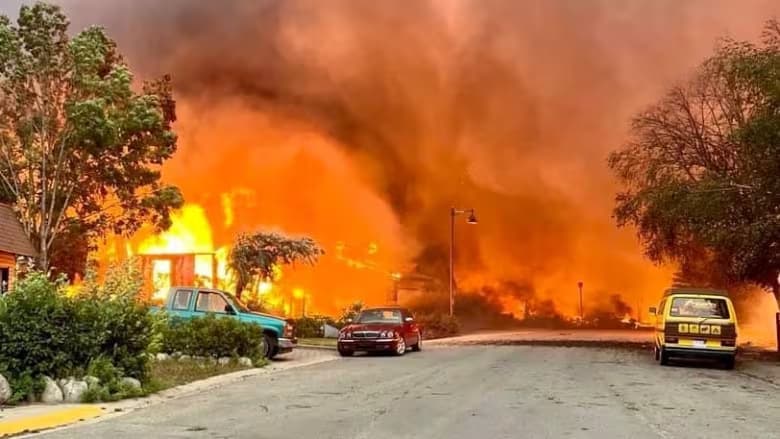One of Canada’s genuinely beautiful places about to be claimed by this year’s wildfire season.
Jasper is fairly remote, about 300km away from the nearest city (Edmonton) and not very many people live there. There are undoubtedly a few people in some danger, and definitely firefighters at risk, but the tragedy is not the threat to human life. Places like this are disappearing into ash

Family stayed at a lodge earlier this month that is now gone.
Working with a bloke who lives there.
Said it was pretty horrendous
Everyone carry on using fossil fuels. Nothing to see here.
Interesting article, thanks for posting.
I feel that in our current society, in our drive to better ourselves (usually an oxymoron in practice for nearly all), perspective is lost early in our journeys into adulthood.
He adds an important sentence to it:
“If I thought we were not going to start to do better,” he says, “and the idea that the malign side of our agency dominated all other sides, that would be a serious point for concern. And in that scenario, I don’t think the argument that it would be better if humanity went sooner rather than later is a crazy argument.”
So, it’s all about where we go from now. If we stay forever as collectively dumb as we are right now, then the planet will be better off without us. The sooner we are erased, the better. On the other hand, if we can evolve quickly enough, and start fixing the current problems, then the planet will be perfectly fine with us on board.
Can we do it? Time will show. If not, we’ll take care of eradicating ourselves rather sooner than later, that’s for sure.
The problem is that we’re clever enough to cause the problem, but too stupid to solve it.
If you travelled through parts of the U.S. where people are driving huge pickups and trucks carrying nothing but a single passenger, notice the almost complete lack of recycling infrastructure, see the huge amounts of nothing that the megastores are selling and realize that most of this is done on credit borrowed from the rest of the world… you would despair and give up.
Issue now is two fold. Yes we need to reduce carbon emissions but we are potentially beyond the point where we really need to be removing carbon from the atmosphere. We have not yet seen the full extent of climate impact from the carbon in the atmosphere today, let alone tomorrow.
Neither is happening in any real significant way
I think it’s even more urgent now to remove carbon emissions as much as we can. The more we wait, the costlier the reckoning will be.
But it seems that we only can learn by suffering. So, we will suffer I guess, before eventually understanding one or two things (always talking at a collective level of course. A lot of individuals understand what is at stake, but not enough yet). Hopefully it will not be too late by then.
The US are the single worst polluters in the world, that’s a fact. But then you hear the MAGA crowd clamouring that extracting oil is ‘part of our culture’ and that it ought to be ‘protected’ against the evil solar and wind industry, supported by the ‘extreme left’. Right in line with what the Heritage Foundation wants them to believe.
The guy I get a lot of my green tech information from is actually a philosophist by training and talks a lot about a concept called “System Justification” to explain our inability to respond to situations like this.
Things wouldn’t be the way they are if this was not the right way, and so any change, no matter how sensible it seems, is probably less right [for reasons]
I have been struck in the last year or so on a seeming change in the discourse around this. For a long time a lot of green energy people were very negative on carbon capture tech, not because they didnt think it was viable, but because of skepticism over who is behind the push for this to be at the forefront of the conversation (it was polluters looking for diversions so they can continue to pollute).
There is now seemingly a growing acceptance that we cannot pick and choose our preferred approach but we need an all of the above strategy and if that does not involve carbon capture we’re kind of fucked.
Indeed. Every little bit will help, and no approach should be dismissed out of hand. Of course, these approaches need to be efficient, and there, a critical and scientific state of mind is still very necessary. Otherwise, there will be people trying to make money out of the urgency, with charlatan approaches.
Indeed. The lag is the real part of the problem. It means the consequences remain largely invisible for now.
I will need to double check some info but i think that if we were to stop adding co2 to the atmosphere today, the timescale for the earth to reset itself is in the thousands of years.
This is why slowing down on co2 emissions is important but also carbon capture.
I’m sure others with more knowledge will correct me if i’m off line with anything and the corrections are welcome.
Many of these ideas are really just intended to kick alternatives further down the line.
Longannet power station in Fife was meant to have a pilot carbon capture system installed. The scheme was scrapped as it was deemed too expensive.
This was actually the 3rd largest single CO2 product plant in Europe. It was actually supplanted by wind energy within 5 years (less time than the CC scheme) and has since been demolished.
The other thing I have doubts about is new nuclear plants. The lead time is around 10 years and they would produce a lot of energy after that. However, in that time, other sources could be up and running and actually making a difference to carbon emissions.
That 10 year lead time is very convenient for carbon polluters.
The focus in Europe on fitting CCS to coal power stations was always driven by expedience. Coal combustion is inherently dirty, producing a highly contaminated outflow from the combustion product. The dirtier the flow, the more expensive the separation process - and the problem with CCS all along has been that per tonne, it is really expensive. The first places to do it effectively (even if not financially appealing) were always going to be facilities with a cleaner outflow, like natural gas processing plants.

